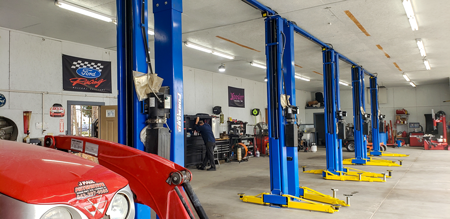All Categories
Featured

[/image]
Routine engine tune-ups are necessary for maintaining your vehicle's performance, boosting gas performance, and extending its life expectancy. Whether you're a skilled automobile owner or a novice, recognizing the crucial facets of an engine tune-up can aid you keep your cars and truck running efficiently for years. Below are some crucial pointers to guide you via the procedure.
- Change the Spark Plugs. Spark plugs are tiny yet mighty components that play an essential role in igniting the fuel-air mixture in your engine. Gradually, they can use out or become fouled, resulting in poor engine efficiency, minimized fuel effectiveness, and hard begins.
Throughout a tune-up, examine your ignition system for wear and change them as required. For the majority of cars, spark plugs ought to be replaced every 30,000 to 100,000 miles, relying on the type and material. Fresh ignition system guarantee efficient burning and smoother engine procedure.
- Examine and Replace the Air Filter. The air filter is your engine's very first line of defense against dirt, particles, and various other pollutants. A clogged or filthy air filter can restrict air flow, triggering your engine to function more difficult and eat even more fuel.
Inspect your air filter throughout a tune-up and change it if it's unclean or previous its preferred solution interval. A tidy air filter improves engine effectiveness and improves fuel economy.
- Check the Gas System. With time, your gas system can gather dirt and carbon down payments, decreasing engine efficiency and gas effectiveness. Cleaning the gas injectors and gas lines during a tune-up assists keep appropriate fuel distribution and combustion.
You can utilize a fuel system cleaner or have a specialist mechanic execute a more comprehensive cleansing. This action is specifically useful for older automobiles or cars regularly driven in stop-and-go web traffic.
- Evaluate the Belts and Pipes. Belts and tubes are important for numerous engine functions, such as running the alternator, water pump, and a/c. Throughout a tune-up, check for splits, fraying, or indicators of endure these components.
Change any worn-out belts and pipes to avoid potential break downs. A busted belt or dripping hose can cause engine getting too hot or loss of power, so resolving these concerns immediately is crucial.
- Change the Engine Oil and Oil Filter. Engine oil is essential for lubing relocating parts, lowering rubbing, and managing engine temperature level. Over time, oil becomes polluted and loses its efficiency.
As part of a tune-up, replace the engine oil and oil filter. Use the sort of oil suggested by your car's producer and adhere to the recommended adjustment periods. Clean oil maintains your engine running efficiently and prevents premature wear.
- Evaluate the Battery and Billing System. A healthy and balanced battery is crucial for starting your automobile and powering its electrical systems. Throughout a tune-up, check the battery's voltage and check the terminals for deterioration. Clean the terminals if required and make sure a safe and secure connection.
Furthermore, test the alternator and billing system to ensure your battery remains charged during operation. If your battery is weak or old, think about replacing it to avoid unforeseen break downs.
- Flush and Replenish the Coolant. The air conditioning system manages your engine's temperature, stopping it from overheating. Old or contaminated coolant can lose its efficiency, causing prospective engine damages.
Throughout a tune-up, flush the old coolant and change it with a fresh blend. Examine the radiator, thermostat, and hoses for leaks or damages. Keeping the cooling system in excellent condition guarantees your engine operates at the appropriate temperature level.

- Address Warning Lights and Unusual Signs And Symptoms. Modern vehicles are outfitted with analysis systems that inform you to prospective concerns with control panel caution lights. If your check engine light or any type of other alerting indications get on, address them during your tune-up.
Additionally, focus on uncommon signs and symptoms such as odd sounds, harsh idling, or decreased gas efficiency. A specialist technician can diagnose and resolve these troubles during the tune-up procedure.
- Don't Fail To Remember the Exhaust System. Your cars and truck's exhaust system eliminates dangerous gases from the engine and ensures proper discharges. Evaluate the exhaust system for leaks, corrosion, or damage during a tune-up. A defective exhaust system can influence engine efficiency and result in environmental and safety issues.
- Use High-Quality Parts and Fluids. When changing parts or rounding off liquids throughout a tune-up, constantly choose high-grade products that fulfill your lorry's requirements. Utilizing substandard parts or inaccurate liquids can adversely influence your engine's efficiency and longevity.
Conclusion: Routine Tune-Ups Are Key to Engine Wellness. Putting in the time to tune up your engine ensures it runs effectively, saves fuel, and minimizes the threat of break downs. Whether you perform these jobs yourself or count on a trusted technician, normal tune-ups are an investment in your lorry's integrity and long life. Comply with these tips, and you'll take pleasure in a smoother, much more trustworthy trip for many years ahead.
Latest Posts
Learn How to Reduce Expenses on Car Maintenance with Montclare Auto Repair’s Exclusive Deals
Specialist Commercial Roof Solutions in North Platte, Nebraska
Dependable Expenses Door Solutions for Residences and Services
More
Latest Posts
Learn How to Reduce Expenses on Car Maintenance with Montclare Auto Repair’s Exclusive Deals
Specialist Commercial Roof Solutions in North Platte, Nebraska
Dependable Expenses Door Solutions for Residences and Services